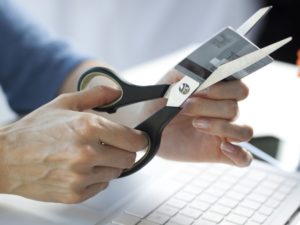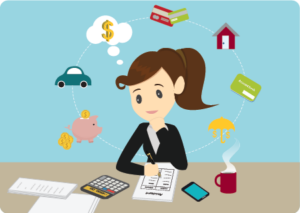Let’s face it, very few people plan not to pay their bills. Financial hardships occur but how you react can determine the long term outcome of your credit scores.
From mortgage or rent, student loans, utilities, auto loans to credit cards monthly, obligations add up quickly. And, if the rug gets pulled from under you by a job loss, illness or unexpected expense, you may find yourself unable to meet monthly obligations.
An unexpected loss of income is the main reason people fall behind on credit card bills. It’s understandable that when you must meet basic needs like mortgage or rent, utilities, and food, a credit card bill goes on the back-burner.
But you don’t have to ignore credit card bills if you ever find yourself unable to pay.
5 Actions to consider when you can’t pay your credit card bill
1. Halt the collection process.
It may take about 30 days for a creditor to send a letter demanding payment. Don’t hide from a creditor. It doesn’t work. You’ll get much better results by being upfront, answering their calls, and responding to their letters. Pick up the phone, explain the situation and ask if they can halt the collection process.
2. Propose a solution.
Don’t let the creditor give you a payment amount you cannot make. Propose a payment that you are sure you can handle. Never make a creditor guess what will work for you. Let them know you have reviewed your budget and making the minimum payment is just not possible right now. Even if it’s $10 bucks a month, offer only what you are positive you can pay. If need be, ask if they can change your due date along with waiving any late fees.
3. Negotiate your credit rating.
Request your creditor to hold off on reporting the late payment to the credit bureaus. Missing even one payment can lower your credit score. And, remember, paying less than the minimum is equivalent to a missed payment. There is no law that says a creditor must report to the credit bureaus at all. Therefore, there is no legal requirement for a creditor to report a missed payment to the credit bureaus. It is the sole discretion of your credit card company to report. Once you are 90 days late most creditors will almost always report to the credit bureaus.
4. Skip your utility bill.
If you’re just one payment behind on your credit card bill, it might be smarter to extend a utility bill in order to pay the credit card bill. Skipping a household utility bill is not usually recommended but you could actually save money if you choose to pay the credit card bill over the electric bill. Late payments can result not only in credit card penalty fees but also in an increase in your APR (annual percentage rate). But utility companies are governed by state laws that prevent them from immediately turning off your lights for missing a single payment.
Utility companies are typically open to setting up payment plans for late utility payments as opposed to credit card companies doing the same. Additionally, if your income has decreased, there are services that may be able to help you with utility payments like the government’s “Low Income Home Energy Assistance Program.”
5. Consolidate into a personal loan.
Consolidate into a personal loan if you owe several credit cards. A debt consolidation loan can lower credit card interest rates and offer one fixed monthly payment. Loan approval is based mainly on your credit score and ability to repay. Borrowers with excellent credit (720 to 850 FICO) have more loan options and may qualify for lower rates.
Borrowers with fair credit scores (580 to 669) should consider online lenders that are designed for people with less than perfect credit.

- Upgrade offers loan amounts: $1,000 to $50,000
- Minimum Credit Score: 600
- Rates range from: 6.98 – 35.89%
- Checking your rate Won’t impact your credit score.
- Repayment terms: Up to 4 years
Consider a debt management plan for late credit card bills
Finally, if you can’t find a resolution in one of the above options, consider a debt management plan. We’re not talking about debt settlement, that’s a whole different ballgame. A debt management plan from a reputable nonprofit credit counselor can be a great solution. Paying down your debt steadily will not only get you out of debt; it will help save your raise your credit scores.
In any case, to avoid serious financial damage don’t allow late payments to get to 180 days (6 months). Once late payments reach 180 days a charge-off ensues. At the point of charge-off the credit card company will sell the debt to a third-party collection agency. You will end up with a charge-off on your credit reports along with the collection agency account. Double negative whammy!
After you get on track with a debt management plan start your emergency fund with a high-yield savings account. Even if you can only save a few dollars a month, start saving now for a rainy day. Having emergency funds can mean a lot to your credit scores.











